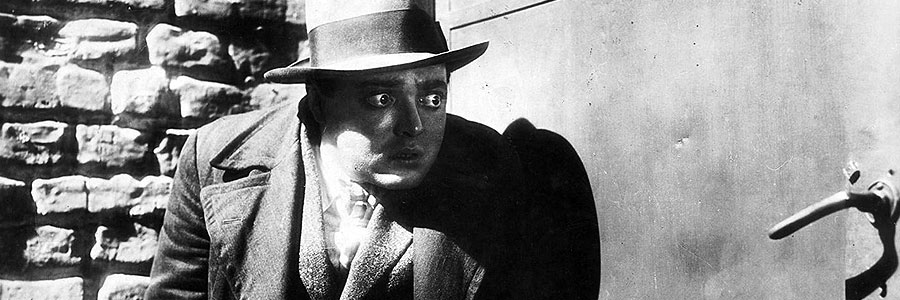
M

M (MOVIE)
Nero-Film A.G.
Release date: May 11th, 1931
Running time: 111 minutes
Country of origin: Weimar Republic
Original language: German
Director: Fritz Lang
Writers: Fritz Lang, Thea von Harbou
Cast: Peter Lorre, Otto Wernicke, Gustaf Gründgens
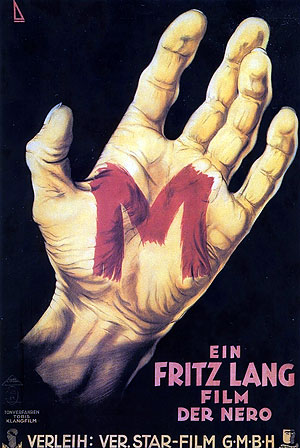
When a crime against a child is committed, we feel something more intense than had it been an adult. A part of our trust in humanity is wiped away and what replaces it is something far uglier. It forces us to look ourselves collectively and ask, how could someone do this to a child? We wonder then, is evil the presence of something, or the absence of it?
Whether it’s the murders of the Soham girls by a caretaker Ian Huntley in 2002, the Moors murders carried out by Ian Brady and Myra Hindley between 1963 and 1965 or toddler James Bulger’s murder in 1993 at the hands of two ten-year-old boys, Robert Thompson and Jon Venables, our feelings remain the same; revulsion, sadness and anger that such things can happen. How can any form of justice put right what these children suffered? What their families suffered… should people take the law into their own hands to deliver a punishment that fits the crime? Does that help with having to deal with the loss of a child?
One of the earliest examples I know of a film tackling these issues is this 1931 film by Fritz Lang. I happened to stumble across it on VHS on day at the library almost exactly 10 years ago. I admit, I was intrigued by the film’s premise. M‘s story begins with a group of children playing a game in the courtyard of an apartment building in Berlin and they’re heard singing a chant about a child murderer. We see a woman setting a table for dinner and waiting for her young daughter, Elsie (Inge Landgut), to come home from school. We then glimpse a wanted poster warning of a serial killer preying on children, and we see anxious parents waiting outside a school for their children.
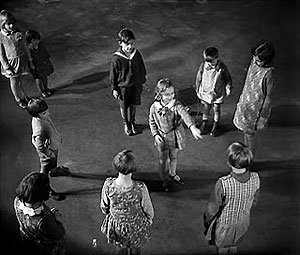
But someone else is waiting for Elsie. Hans Beckett (> Peter Lorre), the man from the wanted poster, is whistling In the Hall of the Mountain King by Edvard Grieg and he approaches the child, offering to buy her a balloon as she’s seen bouncing a ball. The ball rolls away and the balloon gets lost over the telephone lines. We never see Elsie again, and neither does her mother. The murder itself is never shown, but its effects are greatly felt as the town becomes gripped with terror.
In those first minutes we met our killer in the form of Hans and the rest of the story we encounter in M is probably more disturbing than we might expect for a film of this age. At least that’s how I felt when I first watched it. After the murder, Hans teases the police with a letter, but using new techniques in handwriting analysis and fingerprinting they’re able to gleam a few clues from it, but it doesn’t help them much.
With the law slowly at work, it falls to a gang of street criminals to deliver justice to the families 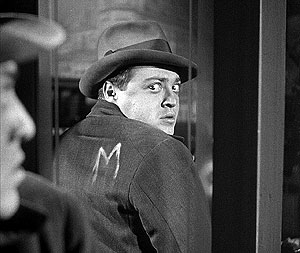 Hans destroyed with his murderous urges. It’s in this way Lang, with a screenplay by his wife Thea von Harbou based on a newspaper article by Egon Jacobson, goes on to make a comment about how we need to look out for our young in a world that was rapidly changing.
Hans destroyed with his murderous urges. It’s in this way Lang, with a screenplay by his wife Thea von Harbou based on a newspaper article by Egon Jacobson, goes on to make a comment about how we need to look out for our young in a world that was rapidly changing.
While others may see M as a film that’s really about the things to come later on in Germany with the rise of fascism, I think that’s a much broader reading than is necessary here. For me, M remains solely about justice when there really can be none in the face of such crimes. This message alone encompasses all such evil, whether the acts are committed by child killers in seedy rented rooms or gas chambers.
Though the film runs for almost 2 hours, Lang fills it with much atmosphere and a deep sense of foreboding. With Lorre playing the childlike killer he comes across more terrifying than many later horror icons. As a masterpiece from early cinema, M excels with its story, performances, cinematography and lighting effects, but be warned, it’s a film that will remain with you long after.
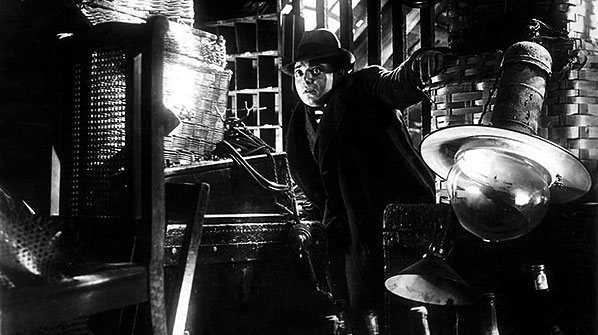

Patrick Samuel
The founder of Static Mass Emporium and one of its Editors in Chief is an emerging artist with a philosophy degree, working primarily with pastels and graphite pencils, but he also enjoys experimenting with water colours, acrylics, glass and oil paints.
Being on the autistic spectrum with Asperger’s Syndrome, he is stimulated by bold, contrasting colours, intricate details, multiple textures, and varying shades of light and dark. Patrick's work extends to sound and video, and when not drawing or painting, he can be found working on projects he shares online with his followers.
Patrick returned to drawing and painting after a prolonged break in December 2016 as part of his daily art therapy, and is now making the transition to being a full-time artist. As a spokesperson for autism awareness, he also gives talks and presentations on the benefits of creative therapy.
Static Mass is where he lives his passion for film and writing about it. A fan of film classics, documentaries and science fiction, Patrick prefers films with an impeccable way of storytelling that reflect on the human condition.
© 2022 STATIC MASS EMPORIUM . All Rights Reserved. Powered by METATEMPUS | creative.timeless.personal. | DISCLAIMER, TERMS & CONDITIONS
HOME | ABOUT | CONTACT | TWITTER | GOOGLE+ | FACEBOOK | TUMBLR | YOUTUBE | RSS FEED
CINEMA REVIEWS | BLU-RAY & DVD | THE EMPORIUM | DOCUMENTARIES | WORLD CINEMA | CULT MOVIES | INDIAN CINEMA | EARLY CINEMA
MOVIE CLASSICS | DECONSTRUCTING CINEMA | SOUNDTRACKS | INTERVIEWS | THE DIRECTOR’S CHAIR | JAPANESE CINEMA





